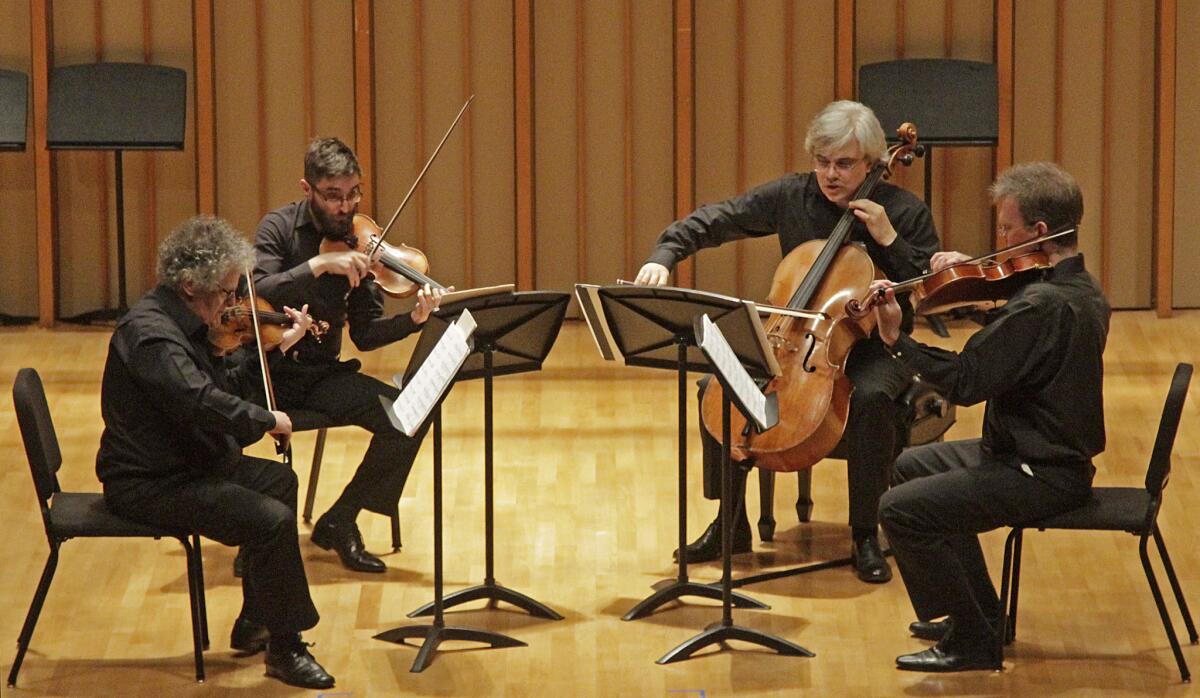Arditti Quartet celebrates 40th anniversary in astounding fashion

- Share via
Formed a few months after the Kronos Quartet, the Arditti Quartet is also on a 40th anniversary tour. By one of those strange coincidences, Arditti, once a competitor of Kronos as the string quartet of the future, arrived in Los Angeles for a Monday Evening Concert at the Colburn School’s Zipper Concert Hall just after the Kronos’ weekend 40th anniversary appearances at UCLA. That wasn’t the only coincidence.
Although both quartets began by finding their footing in the Modernist 20th century quartet literature, it wasn’t long before the ultra-high-Modernist Arditti and the anything-goes Postmodern West Coast Kronos diverged progressive paths as widely as possible.
But there have also been weird overlaps, and these have produced historic nodes in the history of modern music. One was Elliott Carter’s Fifth String Quartet, written for the Arditti in 1995 and given a breathtakingly alert performance to begin Monday’s program.
PHOTOS: Best classical concerts of 2013 | Mark Swed
When Carter wrote his score, he was in his late 80s and long into what was thought to be his late style. That included a slight easing of his rigorous complexity and a move in the direction of more sonic sensuality.
But who could have imagined that Carter was, in fact, entering into an unprecedented late late style with this quartet? Carter composed up to his death at 103 in 2012.
The Fifth Quartet is made of a dozen interconnected fragments, and the one that heralded a breath of fresh air was the 10th, labeled “adagio sereno.” It is slow and serene and consists entirely of string harmonics, which create otherworldly whistling sounds.
These magical three minutes resemble nothing Carter had written before. They happen to have been taken from a tribute he wrote a year earlier to be played by Kronos at a memorial for an inspirational New York music publisher, David Huntley, who died of AIDS at 47 in 1994.
PHOTOS: Faces to watch 2014 | Classical music
For the rest of the program, Arditti was entirely on home ground, although it managed to tweak the Bay Area-based Kronos with two Bay Area-based British composers never in the Kronos cosmos.
That too, Irving Arditti, the quartet’s founder and only original member, said after the concert, was a coincidence. The late Jonathan Harvey taught at Stanford University between 1995 and 2000. Brian Ferneyhough, now 71, followed him to Palo Alto. But both had a long history of writing quartets for the Arditti.
Harvey, who died less than a month after Carter in 2012, might be called an analytical mystic. His music is intricately made. The Second Quartet from 1988, which followed Carter’s Fifth on Monday, finds a sonic center where pitches begin to vibrate in unusually vivid ways. It is as though Harvey had discovered ways in which sound waves could acoustically reinforce one another. At its climax, Harvey’s Second Quartet seemed to grow in sonic size, to sound like a full string band, amplified, burning with fire.
Ferneyhough, long the leader of the New Complexity movement in Britain, has lived in California since 1987 (he taught at UC San Diego before Stanford) but has never had much of a public presence on this coast (or in the U.S. for that matter). His “Dum Transisset I–IV,” written for Arditti in 2006, was the most recent piece on the program. He was not present.
PHOTOS: Operas by Philip Glass
The four short movements were based on quotes from the music of the British Renaissance composer Christopher Tye. Ferneyhough’s many convoluted twists and turns made Tye all but imperceptible. But the moods in this dark, squiggly, mysterious, gothic score spoke directly.
The largest piece was German composer Helmut Lachenmann’s Third Quartet. Its title is “Grido.” It was written for Arditti, and the ensemble gave the piece its U.S. premiere during its last L.A. appearance at a Monday Evening Concert 11 years ago.
“Grido” comes from the names of the Arditti members, but only the “i,” for Irvine Arditti, remains. Violinist Ashot Sarkissjan, violist Ralf Ehlers and cellist Lucas Fels joined between 2003 and 2006. I didn’t hear that earlier performance of “Grido.” But Monday’s was astounding enough to make a listener question his own ears.
Lachenmann’s score explores sonorities. Strings and wooden parts of the string instruments are scraped with bows to make barely perceptible sounds. The instruments are also dug into, horsehair traditionally bowed on strings, yet still the sounds might have been mistaken for loudly amplified and electronically generated sounds. Half of what Arditti did here simply didn’t seem physically possible. Apparently it is.
More to Read
The biggest entertainment stories
Get our big stories about Hollywood, film, television, music, arts, culture and more right in your inbox as soon as they publish.
You may occasionally receive promotional content from the Los Angeles Times.











